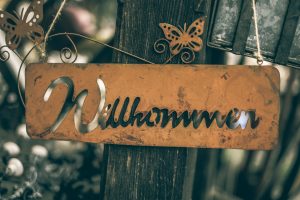Der Wortschatz im Kapitel Eins – Vocabulary in Chapter One

Begrüßungen – Greetings
Hallo! –> Hello!
Guten Morgen! –> Good morning.
Guten Tag! –> Hello! (Good Day)
Auf Wiedersehen! –> Goodbye! (formal)
Bis morgen! –> See you tomorrow.
Bis Samstag! –> See you Saturday.
Willkommen! –> Welcome!
Persönliche Informationen – Personal information
Wie heißt du?/Wie ist dein Name? –> What’s your name?
Wie heißen Sie?/Wie ist Ihr Name? –> What’s your name? (formal)
Ich heiße … –> My name is …
Ich bin … –> I am …
Ich bin Student/Studentin. –> I am a student (m/f).
heißen –> to be called
sein –> to be
haben –> to have
wohnen –> to live (reside)
gehen –> to go or walk
bleiben –> to stay or remain
finden –> to find
Jemanden kennenlernen – To meet someone
Wer ist das? –> Who is that?
vorstellen –> to introduce
Freut mich! –> Nice to meet you.
Angenehm. –> (here) Pleased to meet you.
Es freut mich, dich/Sie kennen zu lernen. –> It is nice to meet you (informal/formal).
Danke. –> Thank you.
Bitte. –> Please / You are welcome.
Entschuldigung. –> Excuse me.
(Es) tut mir leid. –> I am sorry.
Ja, bitte. –> Yes, please.
Nein, danke. –> No, thank you.
Herkunft – Origin/Nationality
kommen aus –> to come from
Woher kommst du? –> Where do you come from? (informal)
die USA –> the US
das Deutschland –> Germany
das Österreich –> Austria
die Schweiz –> Switzerland
das Amerika (Nord-, Mittel-, Südamerika) –> America (North, Central, South America)
das Europa –> Europe
Weitere persönliche Informationen – More personal information
das Jahr (Jahre) –> the year
Wie alt bist du? –> How old are you?
Wie alt sind Sie? –> How old are you? (formal)
Ich bin achtzehn Jahre alt. –> I am 18 years old.
Was ist Ihre Adresse? –> What is your address? (formal)
die Hausnummer (-nummern) –> house number
Wie geht’s? –> How are you? (informal)
Wie geht es Ihnen? –> How are you? (formal)
Sehr gut, danke! –> Very well, thanks.
Es geht mir gut. –> I’m doing great!
Ausgezeichnet! –> Excellent!
Es geht mir nicht so gut. –> I’m not feeling well.
Ich bin müde. –> I’m tired.
An der Uni studieren –> Studying at the University
das Hauptfach (-fächer) –> major
das Nebenfach (-fächer) –> minor
das Studienfach (-fächer) –> fields of study
lernen –> to learn, to study (homework, for a test, etc.)
studieren –> to study (major in; study at university)
der Studentenausweis (-ausweise) –> student ID card
das Studentenwohnheim (-heime) –> dormitory
die Toilette (Toiletten) –> restrooms
Die Woche – The week
der Montag –> Monday
der Dienstag –> Tuesday
der Mittwoch –> Wednesday
der Donnerstag –> Thursday
der Freitag –> Friday
der Samstag/Sonnabend –> Saturday
der Sonntag –> Sunday
das Wochenende (-enden) –> the weekend

